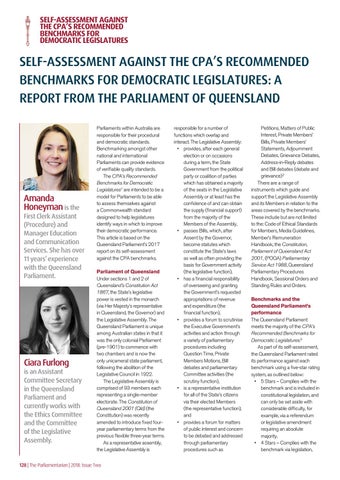SELF-ASSESSMENT AGAINST THE CPA’S RECOMMENDED BENCHMARKS FOR DEMOCRATIC LEGISLATURES
SELF-ASSESSMENT AGAINST THE CPA’S RECOMMENDED BENCHMARKS FOR DEMOCRATIC LEGISLATURES: A REPORT FROM THE PARLIAMENT OF QUEENSLAND
Amanda Honeyman is the
First Clerk Assistant (Procedure) and Manager Education and Communication Services. She has over 11 years’ experience with the Queensland Parliament.
Ciara Furlong
is an Assistant Committee Secretary in the Queensland Parliament and currently works with the Ethics Committee and the Committee of the Legislative Assembly.
Parliaments within Australia are responsible for their procedural and democratic standards. Benchmarking amongst other national and international Parliaments can provide evidence of verifiable quality standards. The CPA’s Recommended Benchmarks for Democratic Legislatures1 are intended to be a model for Parliaments to be able to assess themselves against a Commonwealth standard designed to help legislatures identify ways in which to improve their democratic performance. This article is based on the Queensland Parliament’s 2017 report on its self-assessment against the CPA benchmarks. Parliament of Queensland Under sections 1 and 2 of Queensland’s Constitution Act 1867, the State’s legislative power is vested in the monarch (via Her Majesty’s representative in Queensland, the Governor) and the Legislative Assembly. The Queensland Parliament is unique among Australian states in that it was the only colonial Parliament (pre-1901) to commence with two chambers and is now the only unicameral state parliament, following the abolition of the Legislative Council in 1922. The Legislative Assembly is comprised of 93 members each representing a single-member electorate. The Constitution of Queensland 2001 (Qld) (the Constitution) was recently amended to introduce fixed fouryear parliamentary terms from the previous flexible three-year terms. As a representative assembly, the Legislative Assembly is
128 | The Parliamentarian | 2018: Issue Two
responsible for a number of functions which overlap and interact. The Legislative Assembly: • provides, after each general election or on occasions during a term, the State Government from the political party or coalition of parties which has obtained a majority of the seats in the Legislative Assembly or at least has the confidence of and can obtain the supply (financial support) from the majority of the Members of the Assembly, • passes Bills, which, after Assent by the Governor, become statutes which constitute the State’s laws as well as often providing the basis for Government activity (the legislative function), • has a financial responsibility of overseeing and granting the Government’s requested appropriations of revenue and expenditure (the financial function), • provides a forum to scrutinise the Executive Government’s activities and action through a variety of parliamentary procedures including Question Time, Private Members Motions, Bill debates and parliamentary Committee activities (the scrutiny function), • is a representative institution for all of the State’s citizens via their elected Members (the representative function), and • provides a forum for matters of public interest and concern to be debated and addressed through parliamentary procedures such as
Petitions, Matters of Public Interest, Private Members’ Bills, Private Members’ Statements, Adjournment Debates, Grievance Debates, Address-in-Reply debates and Bill debates (debate and grievance).2 There are a range of instruments which guide and support the Legislative Assembly and its Members in relation to the areas covered by the benchmarks. These include but are not limited to the: Code of Ethical Standards for Members, Media Guidelines, Member’s Remuneration Handbook, the Constitution, Parliament of Queensland Act 2001, (POQA) Parliamentary Service Act 1988, Queensland Parliamentary Procedures Handbook, Sessional Orders and Standing Rules and Orders. Benchmarks and the Queensland Parliament’s performance The Queensland Parliament meets the majority of the CPA’s Recommended Benchmarks for Democratic Legislatures.3 As part of its self-assessment, the Queensland Parliament rated its performance against each benchmark using a five-star rating system, as outlined below: • 5 Stars – Complies with the benchmark and is included in constitutional legislation, and can only be set aside with considerable difficulty, for example, via a referendum or legislative amendment requiring an absolute majority, • 4 Stars – Complies with the benchmark via legislation,
